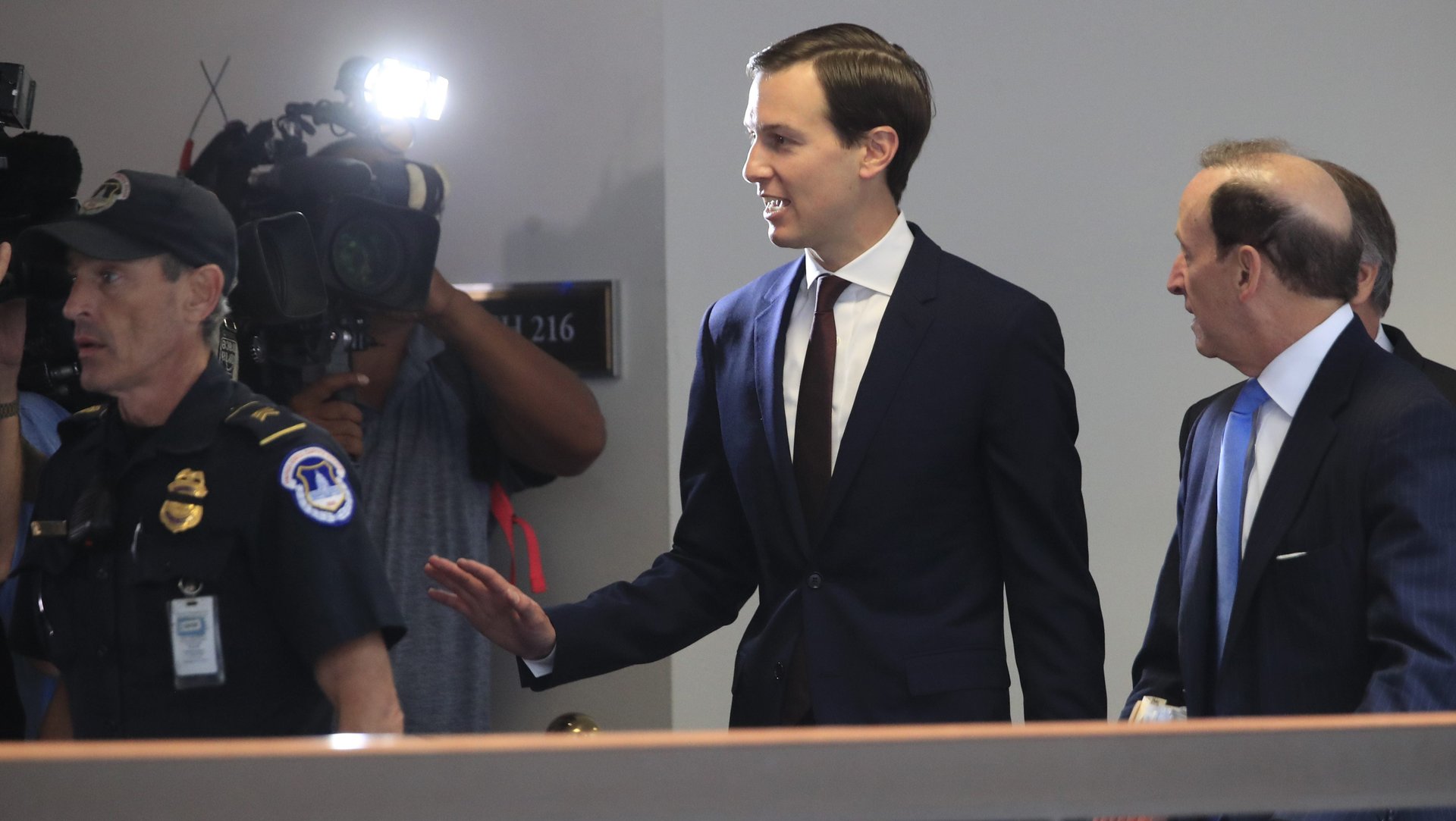Three questions Jared Kushner hasn’t answered in his Senate statement about Russian collusion
US presidential advisor and son-in-law Jared Kushner released an 11-page statement ahead of his appearance this morning before the Senate Intelligence Committee. In it, he says plainly, “I did not collude, nor know of anyone else in the campaign who colluded, with any foreign government.”


US presidential advisor and son-in-law Jared Kushner released an 11-page statement ahead of his appearance this morning before the Senate Intelligence Committee. In it, he says plainly, “I did not collude, nor know of anyone else in the campaign who colluded, with any foreign government.”
Kushner’s statement is an attempt to clear up the growing number of questions about the Donald Trump campaign’s interactions with Russian officials or agents for Russia last year. But it raises several more, thanks to some puzzling omissions and explanations.
When Kushner left the meeting with a Kremlin-connected Russian lawyer, why didn’t he take the rest of Trump’s team with him?
Kushner’s statement discusses a meeting he took on June 9, 2016. That’s when Kushner joined Trump’s son, Donald Trump Jr., and his soon-to-be campaign manager Paul Manafort in a meeting with a Kremlin-connected Russian lawyer and a Russian-American lobbyist. Kushner came to the meeting with no knowledge of what was to be discussed, he says—in part because he didn’t read the preceding email chain in which a middleman promised Trump Jr. information that “would incriminate Hillary [Clinton] and her dealings with Russia and would be very useful to your father.” Those emails have raised questions about whether Trump campaign officials may have broken the law.
When he arrived late to the meeting, Kushner writes in his statement, he found that the topic was US adoptions of Russian children. “I had no idea why that topic was being raised and quickly determined that my time was not well-spent at this meeting,” he says. In fact, he writes, he emailed an assistant from the meeting after 10 minutes: “‘Can u pls call me on my cell? Need excuse to get out of meeting.'”
Whether or not the meeting’s primary topic was adoptions—and not incriminating information about Clinton, as mentioned in the emails prior to the meeting—has been the topic of much speculation. In any case, Kushner says he concluded that the meeting was a “waste of our time.” But he did not try to end the meeting or bring Trump Jr. and Manafort with him when he left. The three never discussed the meeting afterward, Kushner writes. “I thought nothing more of this short meeting until it came to my attention recently.”
Why didn’t the meeting set off alarm bells for Kushner, and why didn’t he report it sooner?
US intelligence agencies released a report on their concerns about Russian meddling before the inauguration in January, and several government entities have been conducting investigations for months. But Kushner only disclosed the meeting recently (paywall) on his security clearance form known as a SF-86, and Trump Jr. made the meeting public this month.
Given the intense scrutiny of the administration and its ties to Russia, one might expect Kushner’s own legal team, or someone inside the administration, to have combed through his emails and phone records to find any Russia-related contacts during the campaign or since before Trump took office, and disclose them early on.
Despite all that, Kushner’s explanation suggests that he was relying on his own memory, not a rigorous internal process, to handle questions on a high-profile investigation that touches on issues of national security:
For reasons that should be clear from the explanation of that meeting I have provided, I did not remember the meeting and certainly did not remember it as one with anyone who had to be included on an SF-86. When documents reviewed for production in connection with committee requests reminded me that meeting had occurred, and because of the language in the email chain that I then read for the first time, I included that meeting on a supplement.
Did Cambridge Analytica, the data firm Kushner hired, coordinate with Russian “fake news” sources to target US voters?
Kushner makes no mention in his statement of Cambridge Analytica, the data-mining firm owned by billionaire and Trump backer Robert Mercer, which he hired during the campaign to target potential Trump voters on social media. But as Benjamin Wittes, the editor of the Lawfare blog, points out, some of the senators questioning him today will likely want to know about Cambridge Analytica’s potential links to Russian government-backed entities that some in US intelligence agencies believe aimed to influence the election.
Congressional investigations are looking into potential ties between Cambridge Analytica, Breitbart news, and Moscow, and the “viralizing” of fake news stories that may have helped influence how US citizens voted, Time reported in May.
“We need information from the companies, as well as we need to look into the activities of some of the Trump digital campaign activities,” Senator Mark Warner, a member of the intelligence committee, said earlier this month.